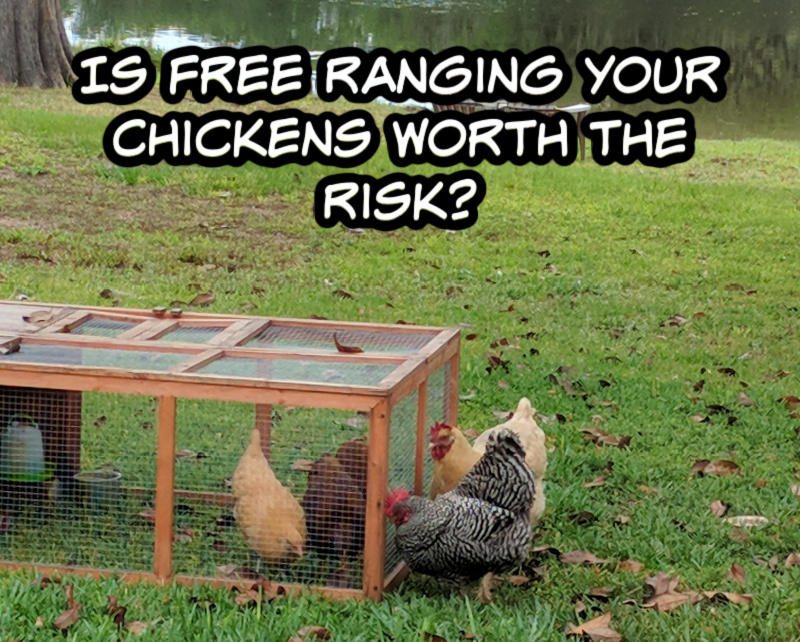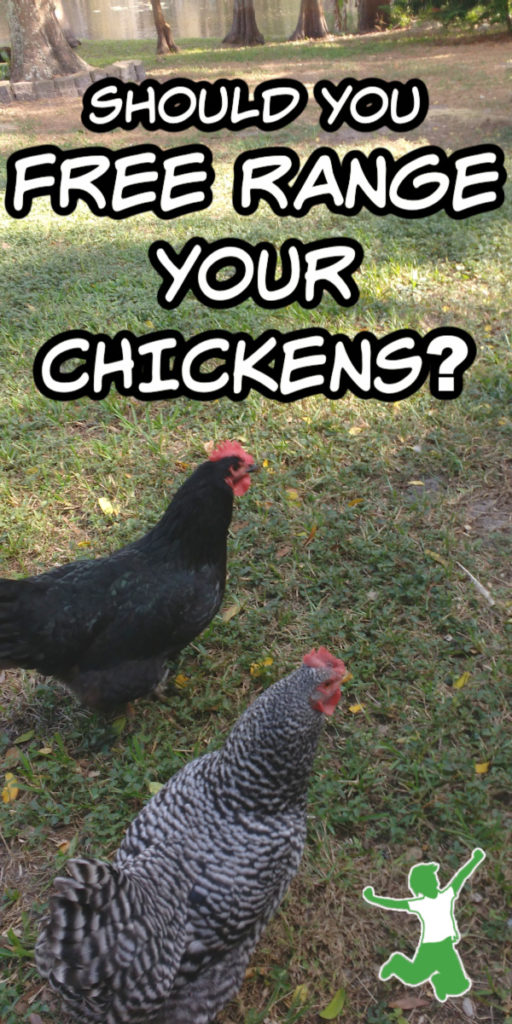Table of Contents[Hide][Show]
The benefits of allowing egg-laying chickens to free-range at home and how to minimize the risks of regular roaming around your yard or property.

When I first started keeping chickens for eggs at home nearly ten years ago, one of the knowledge-based skills I needed to learn was what times of day were safe in my neighborhood to open the coop and let the hens out to roam.
Benefits of Free-Ranging Your Backyard Chickens
While my coop has a run that is completely safe from predators and is also mobile so I can move it around to fresh patches of grass regularly, I still like to let them out to roam beyond this area as much as possible.
This greatly expands the hens’ foraging for bugs, shoots, and grubs.
More Nutritious Eggs
Roaming hens have much more nutritious eggs than those that don’t have this opportunity.
This is true even if you buy the most well-balanced, organic feed possible (this is the one I use). Nothing can replace fresh food in your hen’s diet!
Less Expensive
If your hens are foraging, they will obviously eat less feed! This reduces the cost of keeping chickens too! You can, of course, feed them kitchen scraps to accomplish the same objective.
However, I don’t feed my chickens kitchen scraps. In my experience, it tends to give them watery droppings that are a mess to clean up if they end up on your porch or patio.
I prefer free-ranging for fresh food and good quality feed alone for the least mess when it comes to chicken droppings.
Healthier Hens
Free-ranging is also good for your chickens! Hens that free-range live longer…10 years or even more…than those cooped up 24/7.
Enclosed coops, even if the chickens have a decent amount of room to move around, tend to become nothing but dirt in short order.
Hens living in these conditions are more prone to getting sick. And, if you’ve kept chickens for any length of time, you know that a sick chicken takes a lot of care. Birds in general are not as hardy as mammals.
Pest-free Homestead
One of the least heralded benefits of roaming chickens on your homestead is that they keep bugs and other small pests to a minimum.
I’ve written before about how a few roaming chickens can eliminate spiders, wasps, and over time, even snakes (hens eat them when they are small) around your yard and in your home!
A family-sized flock of layers is the best chemical-free pest control you can ever have!
How to Safely Roam Your Hens
Once you realize the huge benefits of letting hens roam your property, the next question is, what times of day are safe?
There are many predators that lick their chops at the prospect of eating a tasty chicken, so keeping your precious birds safe is very important business!
Here is the list of predators in my neighborhood alone. I’m sure there are others to add from your neck of the woods!
- Hawks
- Bald Eagles
- Possum
- Raccoon
- Alligator
- Bobcat
- Coyote
- Fox
Thus, if you choose to embrace the benefits of letting your birds roam, you will need to understand how to keep them safe. Note that time of day is of particular importance to your roaming strategy!
Poultry Netting
I use durable poultry netting to keep my hens roaming on our property only. It is easily moved around based on the season/weather conditions and keeps the neighbors happy.
It also serves to increase the safety of chicken foraging.
You can get poultry netting electrified (solar) or not. Our netting is not electrified and we find that it still works very well.
Note that even if electrified, poultry fencing will not keep out all types of predators. For example, hawks can swoop in from above and bobcats or coyotes can easily jump over fencing.
Clipping Chicken Wings
If you have one or more birds who like to flex on the rest of the flock by flying over your poultry netting, you might find that clipping the hen’s wings are necessary. This is completely painless (like trimming our nails), but only needed for those hens that “fly the coop” on a regular basis.
It is also usually needed for the occasional hen, not roosters.
Roosters tend to stay close to the larger group of girls rather than the one or two who like to escape!
What Time of Day is Best for Chickens to Roam?
I’ve only lost two birds to predators over the years, and in both instances, the time of day was the key factor that contributed to the attack.
When I first started researching what times of day were safe for hens to free-range, I was shocked that the general consensus on chicken-themed websites was dawn to dusk.
This seems irresponsible to me, because dawn and dusk are the PRIMARY times of day that predators hunt and kill their prey!
Getting back to the two chickens I’ve lost in the past, one was lost at dawn and the other at dusk. And, both times they were outside the coop, free-ranging!
When to Keep Your Hens Inside the Coop
Thus, I developed a practice to never have my chickens out foraging at either sunrise or sunset. They are safe in their coop during those times.
I tend to let them out no earlier than one to two hours after sunrise. For example, sunrise today at our home was 6:43 am. I opened the coop at 8:15 am.
At night, I bring them in an hour or so before sunset. If I’m going somewhere, I will bring them in even earlier if necessary. Cutting their foraging time by a few hours every now and then does not significantly affect the egg quality.
I never, ever let my chickens roam at dawn or dusk! This is the most dangerous time of day for your hens to be foraging, at least in my experience!
Chicken Coop Timers
If you can afford a chicken coop timer that automatically opens/closes the door, this will partially work to make things easier to keep roaming hens.
This is because chickens will typically NOT go into the coop voluntarily until dusk.
This is true for every chicken breed I’ve kept.
If you want to get hens inside the coop an hour before sunset to reduce the risk of predator attacks, you will need to entice them inside with some food every single night!
However, coop timers work great for the morning. Set the timer to open the door an hour after sunrise, and that will work perfectly for those that need to leave for work earlier or want to sleep in.
Ultimately, coop timers seem most convenient for when you are out of town and don’t have anyone to look in on your hens for you.
Are Roaming Hens Worth the Risks?
Hence, if you are considering free-ranging your chickens on your property, I can tell you that it is well worth the effort!
Just be sure to keep them safely inside the coop from an hour before sunset to an hour after sunrise to virtually eliminate the risk of predator attacks.









Last question about feed….I completely understand soy free but why corn free? Aren’t chickens traditionally raised with corn in the diet? Corn that is organic is a good thing yes? Thank you!
We do supplement with oyster shell and crushed eggshells yet still had the girls laying soft eggs.
Wow that is very odd!
Hi Sarah,
We have our chickens roaming around free for about three hours/day, and we are feeding an organic no-soy, no-corn, seed mix similar to the one you recommend (New Country Organic). At least two of our girls are laying soft eggs which indicates a nutrient deficiency? I call the Avian Hotline at Colorado State University for tips and they think that since the chickens are “flicking” and throwing the food around they are picking and choosing rather than getting a complete balance of nutrients. Kind of like when your children eat all the dinner rolls and leave their vegetables on the plate:)
They recommend switching to a pellet. Pellets and crumble are obviously processed and heated, BUT it does make sense that they would offer more complete nutrition (minus what is lost in the heating process). My thoughts moving forward are to 1. keep fermenting the seed mix and make more of a clumpy mash that they cannot separate or 2. switch to pellets or 3. do both? What do you think? Thank you! _Cheryl
If you use New Country Organics alone, you really need to supplement with free choice oyster shell IMO.
All of the hens I have lost were killed by foxes in the middle of the day.
So sad to hear this! The foxes in our area only are out at dusk and dawn or the middle of the night (of course).
Thanks for the article Sarah! We feed our chickens a mixture of seeds, similar to the one you recommended…do you soak/sprout and ferment the chicken feed?
Hi Cheryl, I give the organic soy free, corn free feed to the chickens as is. They don’t eat that much anyway because they free range everyday. If they were in a coop all the time and the feed was their primary source of food, I would probably ferment it first.
We have been using moveable electrified poultry netting since we moved our chickens into the coop. They have a “porch” and access to under the coop and a few trees to keep them safe from hawks. We can’t figure out how to entice all the birds into the coop before dusk – we have 27 right now. Pest control is the main reason I wanted the birds- especially ticks! I’m glad to hear free ranging can help them live long, healthy lives. My daughter got them through 4-H and they are more pet than farm animal.
Weasels and foxes and hawks, oh my!